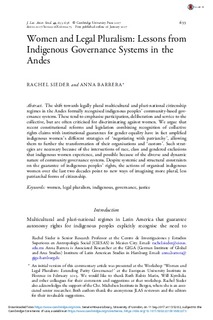| dc.contributor.author | Barrera, Anna | |
| dc.contributor.author | Sieder, Rachel | |
| dc.date.accessioned | 2018-02-14T15:01:38Z | |
| dc.date.issued | 2017-01-01 | |
| dc.identifier | oai:www.cmi.no:6399 | |
| dc.identifier.citation | in Journal of Latin American Studies vol. 49 no. 3 pp. 633-658 | |
| dc.identifier.issn | 0022-216X | |
| dc.identifier.uri | http://hdl.handle.net/11250/2475464 | |
| dc.description.abstract | The shift towards legally plural multicutural and pluri-national citizenship regimes in the Andes formally recognised indigenous peoples' community-based governance systems. These tend to emphasise participation, deliberation and service to the collective, but are often criticised for discriminating against women. We argue that recent constitutional reforms and legislation combining recognition of collective rights claims with institutional guarantees for gender equality have in fact amplifies indigenous women's different strategies of 'negotiating with patriarchy', allowing them to further the transformation of their organisations and 'customs'. Such strategies are necessary because of the intersections of race, class and gendered exclusions that indigenous women experience, and possible because of the diverse and dynamic nature of community governance systems. Despite systemic and structural constraints on the guarantee of indigenous peoples' rights, the actions of organised indigenous women over the last two decades point to new ways of imagining more plural, less patriarchal forms of citizenship. | |
| dc.language.iso | eng | |
| dc.relation | Journal of Latin American Studies | |
| dc.relation | 3 | |
| dc.relation.ispartof | Journal of Latin American Studies | |
| dc.relation.ispartofseries | Journal of Latin American Studies vol. 49 no. 3 | |
| dc.relation.ispartofseries | Journal of Latin American Studies vol. 49 no. 3 | |
| dc.relation.uri | https://www.cmi.no/publications/6399-women-and-legal-pluralism | |
| dc.title | Women and legal pluralism: Lessons from indigenous governance systems in the Andes | |
| dc.type | Journal article | |
| dc.type | Peer reviewed | |
| dc.identifier.doi | 10.1017/S0022216X16002273 | |
